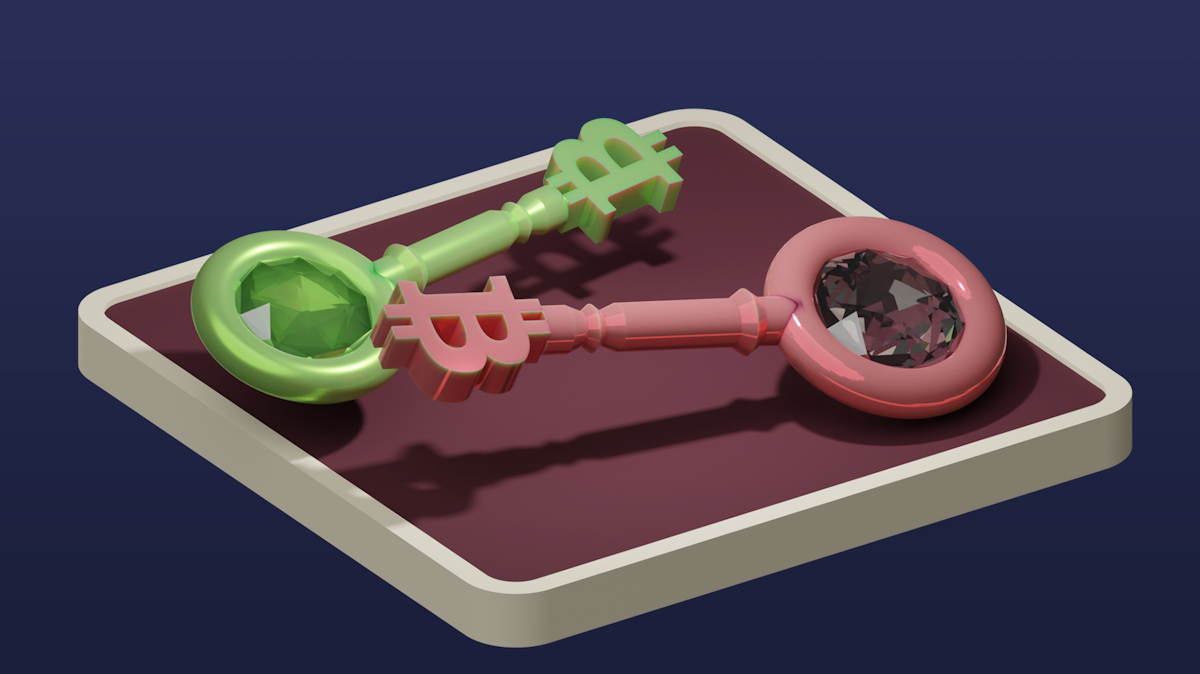What is a public key and what is a private key?
A public key is used as an address to receive coins. A private key is used to issue coins. That is why your private key is so important and must be kept secret. It is important to know what these two mean and what that means for an investor in cryptocurrency. This lesson is designed to inform you exactly what these terms mean so that you remain vigilant in your crypto adventures.
Key indicators
✔️ Bitcoin transactions require two keys: a public key to receive and a private key to transmit.
✔️ The private key is the most important, giving access to your funds. If someone knows this key they can steal your crypto.
✔️ The public key can be generated by an algorithmic derivation of the private key and is visible on the cryptocurrency ledger.
✔️ All transactions are tracked and processed on the blockchain, keeping the shared ledger up-to-date
Private/public key
We hear these words come up more often, public key and private key. But what do they really mean by that?
Satoshi Nakamoto did recognize that two keys were needed to get around certain problems in cryptography. You needed a public key to receive Bitcoin and a private key to send your Bitcoin. The last key is therefore the most important one. With this system, you could work with Bitcoin in a secure way and stealing it was only possible if you had access to the private keys.
From this comes another well-known saying: not your keys, not your coins. By this is meant that if you do not have the private keys you are also not technically the owner of those coins. This happens for example on exchanges. The exchange owns the private keys and you own the public keys.
What is a public key?
Let's take a closer look at the public key. If you want to send cryptocurrency to someone else you need his address (=public key). He can look it up on an exchange or wallet, for example. He can also create one himself.
The public key is created by an algorithmic derivation of your private key. You can have as many public keys as you want, but you only have one private key. Some people even use a different public key for each transaction, because they don't want people to know all the funds they sent and received.
The thing is, your public keys are public on the ledger of a cryptocurrency database. So anyone can see on a blockchain explorer what happened by address. If you use the same address often enough, people may be able to make some kind of deduction from this regarding your private data.
For most people, this won't matter much. But some people, who have a lot of crypto, may want to keep their transactions secret. And they can. Fortunately, you don't have to memorize or type these long addresses, you can just copy and paste them from the wallet or exchange.
A public address or public key from Bitcoin, for example, looks like this:
1L4RVR6BHXcEL3NNPcBdEcLHA1bn7yJhjM
What is a private key?
A private key is your secret key, which gives access to your funds. If someone knows this key he can steal your crypto. If you know it yourself, you can also spend your coins, which is quite convenient. A private key is created by drawing out a string of at least 21 random characters. It cannot be derived like the public key.
A private key looks like this:
5Kb8kLf9zgWQnogidDA76MzPL6TsZZY36hWXMssSzNydYXYB9KF
You can think of the private key as the signature you put under an official document to prove that you did the transaction. After all, you are the only one who knows this secret key; no one has your writing style. Every time you sell coins, you do so by signing with your private key. Otherwise, the sale cannot go through. If a transaction is intercepted by hackers, for example, the key is changed from the transaction and it does not go through. A very secure system.
How do private keys and public keys work together?
You can think of this cooperation between public and private keys as the equivalent of your bank account. Anyone can know what your bank account is, your public key, but taking funds from it is another matter. So you have some private keys in your possession that others don't have, preventing them from spending money from you. You have a bank card with your PIN. Only you know that PIN. That is your private key. If someone has your bank card, they still can't withdraw anything from your bank account. With home banking you need your bank card and your e-dentifier. That is another private key. Furthermore, you still need to log in to your bank, another private key.
On a cryptocurrency blockchain, it works the same way. With your public keys, you can give people an address to which they can send crypto. Of these, you can have as many as you want. All these coins arrive at the same private address, which you can access through your private keys. When a transaction is complete, it is entered into the public distributed ledger and the network knows which private addresses have which funds. All transactions are tracked in this way and processed in a new block on the blockchain, so the state of the ledger is always up to date.

